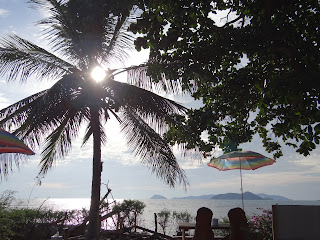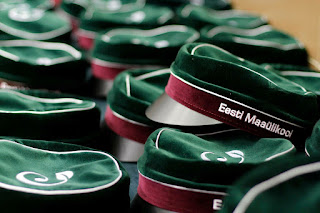Palm Trees and Plastic Waste
I want to
go to a paradise like this.
The book I
read about Thailand was right: While transportation seems chaotic, it always
works out. You can be sure that somebody is always waiting for you and you will
always somehow reach your destination.
When I enter
the bus the stewardess asks which island I’m going to and she promises to
organize a taxi from the bus station to the pier. Suddenly, I and five other farang are dropped off by the side of a
road seemingly in the middle of nowhere. We’re confused at first, but there is
indeed a pick-up truck with a “taxi” sign waiting for us. From here, the
distance to the harbor is shorter than from the bus station, it turns out.
All the
others are going to a different island and are dropped off first, before I go
to a smaller pier. Most people go to Koh Chang from Trat, but I heard it’s
quite touristy. And while I do want a bed, fresh water and the opportunity to
buy food, I don’t need all those European faces around me when I’m in Asia.
The
speedboat can fit about thirty passengers, luggage in the front, everybody in
life wests, and after a one hour ride we’re there.
Trat was
already more tropical than Surin, greener, with more palm trees. The tiny
islands we pass look like straight from a movie – which of course they are, “The
Beach”, a James Bond, and many more were filmed on Thailand’s islands. Lush
green jungle, white sandy beaches, dark rocks – a dream of a vacation spot.
Although
nobody had answered my emails and I never told the accommodation at what time I’d
be arriving, a motorbike is already waiting for me at the pier on the island.
This is where it starts: The girl picking me up is one of many, many Germans on
this island. They work here, they live here for months, they populate the
beaches, bars and cafés. Still, there are not too many people altogether, so it’s
easy to escape the Germans and other foreigners.
I’m staying
at the “Banana Sunset” in a small tent just by the water. The viewing terrace
was destroyed by the storm two weeks ago, so they give a 20% discount on all
foods at the moment. “No meat, no egg, no fish sauce”, I explain to the
charming Cambodian who runs the resort. “Sure, we’ll make something for you!”
This is a
wonderful place to meet people, not only because I look for a partner for the “Buy
one get one free” drinks. People just sit down next to each other, introduce
themselves and start talking. It can go anywhere from “where else in Thailand
have you been and how long are you staying here?” to meaningful conversations
about life. Everybody greets the fellow guests. It may be because everything
takes place outside, the food, the drinks, the bathrooms and the sunset
viewing. It may be because the tents are so close to each other that there is
no real privacy. Or maybe it’s because we all came here for similar reasons and
this is just a great place on a small tropical island, where the employees sit
down with the guests to have a drink, be it during or after the sunset. The “Banana
Sunset” is definitely a good spot for hanging out with fellow travelers,
inspiring conversations, delicious food, and of course, the best sunset view.
If a stony
beach and a pool are not enough for you, I recommend the “Lazyday Resort” next
door, with its bungalows spread out by a sandy beach – swings on palm trees
included.
The
islanders still don’t rely on tourism, coconuts and rubber are the main income
factors. Neither jet skis nor big hotels have found their way to the island.
There are few cars and the island is advertised as environmentally friendly – you
can explore all of Koh Mak by bike! There are drinking water refill stations, a
Trash-Hero group meets every week to clean the beach and at the “Pineapple
Dessert bar” I get a reusable bamboo straw with my iced coconut-milk green tea.
From now on I can show this to people when my pronunciation of “mai aow lod” –
no straw please – is wrong again.
Apart from
the temple that provides the best view for the sunrise, I of course have to visit
the animal clinic that was founded here only two or three years ago. It’s run
completely by volunteers who work for accommodation, vets, vet nurses and
students who come here for a couple of weeks to vaccinate, deworm and neuter or
castrate the street dogs and cats. The medication and equipment is financed through
donations alone. (Their Facebook page) Most animals on this island have a place
where they pretty much live, a resort or restaurant, but when it comes to
paying treatments, nobody wants to be the owner of course.
While the
island continues to keep mass tourism away, the paradise is in danger. There
are the plastic cups and chips bags on the sides of streets, bottle caps and
plastic straws on the beaches, bags and fishing gear in the trees that stand in
the water during high tide… It makes me angry and sad at the same time – we know
about this, we know that our consumption, the single-use plastic and the fishing
industry destroy our planet. So why do we keep consuming these things? How can
we still eat seafood and buy groceries that come in plastic packaging or small
plastic bottles, accept drinks with plastic straws?












Kommentare
Kommentar veröffentlichen